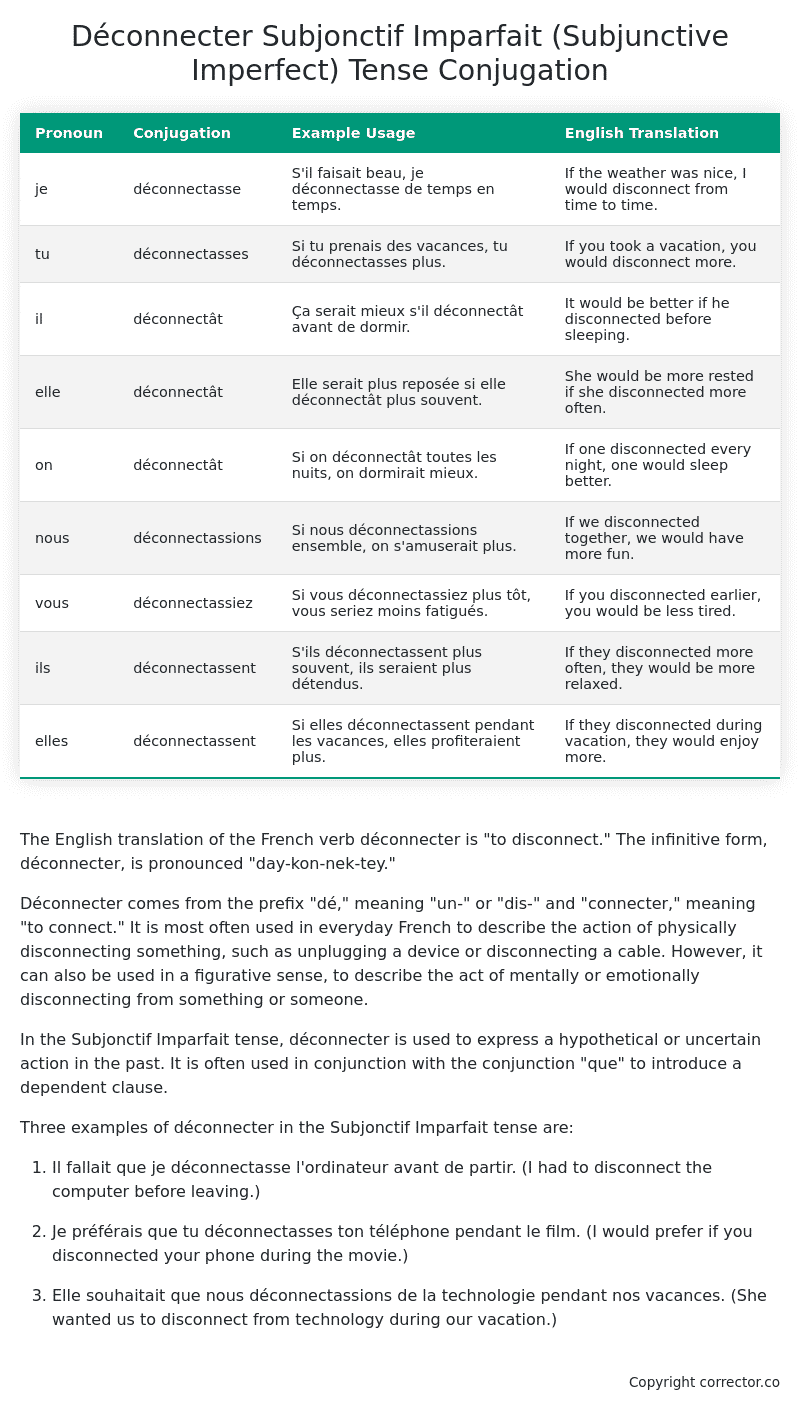Subjonctif Imparfait (Subjunctive Imperfect) Tense Conjugation of the French Verb déconnecter
Introduction to the verb déconnecter
The English translation of the French verb déconnecter is “to disconnect.” The infinitive form, déconnecter, is pronounced “day-kon-nek-tey.”
Déconnecter comes from the prefix “dé,” meaning “un-” or “dis-” and “connecter,” meaning “to connect.” It is most often used in everyday French to describe the action of physically disconnecting something, such as unplugging a device or disconnecting a cable. However, it can also be used in a figurative sense, to describe the act of mentally or emotionally disconnecting from something or someone.
In the Subjonctif Imparfait tense, déconnecter is used to express a hypothetical or uncertain action in the past. It is often used in conjunction with the conjunction “que” to introduce a dependent clause.
Three examples of déconnecter in the Subjonctif Imparfait tense are:
-
Il fallait que je déconnectasse l’ordinateur avant de partir. (I had to disconnect the computer before leaving.)
-
Je préférais que tu déconnectasses ton téléphone pendant le film. (I would prefer if you disconnected your phone during the movie.)
-
Elle souhaitait que nous déconnectassions de la technologie pendant nos vacances. (She wanted us to disconnect from technology during our vacation.)
Table of the Subjonctif Imparfait (Subjunctive Imperfect) Tense Conjugation of déconnecter
| Pronoun | Conjugation | Example Usage | English Translation |
|---|---|---|---|
| je | déconnectasse | S’il faisait beau, je déconnectasse de temps en temps. | If the weather was nice, I would disconnect from time to time. |
| tu | déconnectasses | Si tu prenais des vacances, tu déconnectasses plus. | If you took a vacation, you would disconnect more. |
| il | déconnectât | Ça serait mieux s’il déconnectât avant de dormir. | It would be better if he disconnected before sleeping. |
| elle | déconnectât | Elle serait plus reposée si elle déconnectât plus souvent. | She would be more rested if she disconnected more often. |
| on | déconnectât | Si on déconnectât toutes les nuits, on dormirait mieux. | If one disconnected every night, one would sleep better. |
| nous | déconnectassions | Si nous déconnectassions ensemble, on s’amuserait plus. | If we disconnected together, we would have more fun. |
| vous | déconnectassiez | Si vous déconnectassiez plus tôt, vous seriez moins fatigués. | If you disconnected earlier, you would be less tired. |
| ils | déconnectassent | S’ils déconnectassent plus souvent, ils seraient plus détendus. | If they disconnected more often, they would be more relaxed. |
| elles | déconnectassent | Si elles déconnectassent pendant les vacances, elles profiteraient plus. | If they disconnected during vacation, they would enjoy more. |
Other Conjugations for Déconnecter.
Le Present (Present Tense) Conjugation of the French Verb déconnecter
Imparfait (Imperfect) Tense Conjugation of the French Verb déconnecter
Passé Simple (Simple Past) Tense Conjugation of the French Verb déconnecter
Passé Composé (Present Perfect) Tense Conjugation of the French Verb déconnecter
Futur Simple (Simple Future) Tense Conjugation of the French Verb déconnecter
Futur Proche (Near Future) Tense Conjugation of the French Verb déconnecter
Plus-que-parfait (Pluperfect) Tense Conjugation of the French Verb déconnecter
Passé Antérieur (Past Anterior) Tense Conjugation of the French Verb déconnecter
Futur Antérieur (Future Anterior) Tense Conjugation of the French Verb déconnecter
Subjonctif Présent (Subjunctive Present) Tense Conjugation of the French Verb déconnecter
Subjonctif Passé (Subjunctive Past) Tense Conjugation of the French Verb déconnecter
Subjonctif Imparfait (Subjunctive Imperfect) Tense Conjugation of the French Verb déconnecter (this article)
Conditionnel Présent (Conditional Present) Tense Conjugation of the French Verb déconnecter
Conditionnel Passé (Conditional Past) Tense Conjugation of the French Verb déconnecter
L’impératif Présent (Imperative Present) Tense Conjugation of the French Verb déconnecter
L’infinitif Présent (Infinitive Present) Tense Conjugation of the French Verb déconnecter
Struggling with French verbs or the language in general? Why not use our free French Grammar Checker – no registration required!
Get a FREE Download Study Sheet of this Conjugation 🔥
Simply right click the image below, click “save image” and get your free reference for the déconnecter Subjonctif Imparfait tense conjugation!

Déconnecter – About the French Subjonctif Imparfait (Subjunctive Imperfect) Tense
Formation
Common Everyday Usage Patterns
Interactions with Other Tenses
Subjonctif Présent
Indicatif Passé Composé
Conditional
Conditional Perfect
Summary
I hope you enjoyed this article on the verb déconnecter. Still in a learning mood? Check out another TOTALLY random French verb conjugation!


